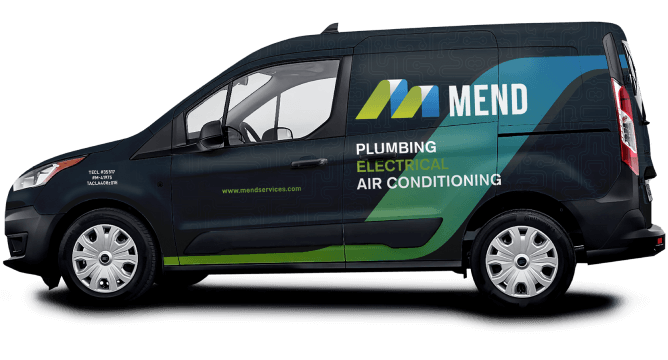A mistake many homeowners make is waiting to schedule water heater repair in Lakeway, TX. At Mend Services, we encourage customers to schedule hot water heater repair at the first signs of trouble. A malfunctioning water heater tends to use more electricity or fuel. In addition, water heater problems often worsen and become more expensive to fix.
Water Heater Repair Service in Lakeway, TX
Schedule NowProfessional Water Heater Repair Services
Another common mistake is taking a break-fix approach to a water heater. Homeowners can avoid the most common water heater repair issues through preventative maintenance. That includes flushing the tank of limescale and sediment. Our plumbers will also replace the anode rod as needed. That rod attracts minerals and keeps those substances from accumulating on components and the tank walls.
Limescale buildup can cause inefficient operation and manifest in a wide range of odd behaviors. A prevalent symptom is low water pressure. If hot water pressure is low and cold water pressure is fine, it’s often limescale clogging up the output. That said, limescale can affect cold water pressure too. When this happens, it usually means that limescale has built up beyond the water heater and into the plumbing.
Many homeowners experience power issues with their water heaters. This is prevalent with electric water heaters and fuel-fired units. Many of those use some electricity too. An isolated tripped circuit breaker typically isn’t a concern. Multiple trips indicate a problem; you shouldn’t continue resetting the breaker. It could just be a bad breaker. It could also be a faulty thermostat, loose electrical connection, bad wire, or leak dripping onto a wire.
Fuel-fired water heaters require additional annual maintenance. This includes cleaning the combustion system and ensuring the unit properly vents gases. If you get a carbon monoxide (CO) alarm, turn off the water heater and contact us right away. If your pilot light goes out, you can clear the combustion chamber and attempt to relight it. Don’t keep relighting it, as that may indicate a serious problem. Another indication of a critical issue with the combustion system is a pilot light that burns a color other than blue.
Modern water heaters are virtually silent. Older systems may make some noise, but keep an ear out for loud or unusual sounds. If you hear banging or rumbling sounds, that likely suggests too much limescale or sediment in the tank. It could also be that the pressure is too high, and the release valve isn’t doing its job. Problems with valves can cause screeching or whistling, and crackling or hissing is usually a sign of an electrical issue.
- Unpleasant smells
- Running out of hot water fast
- Inconsistent water temperatures
- Leakage no matter how seemingly minor
- Increased fuel or electricity consumption
Offering comprehensive plumbing solutions tailored to meet your needs, including emergency services and expert installation, maintenance, repair, and replacement of your home’s plumbing system.
- Emergency Services
- Plumbing Replacement
- Plumbing Maintenance
- Plumbing Repair
- Plumbing System Installation
Providing a full spectrum of sewer services, including unclogging pipes/drains, maintenance, hydro-jetting techniques, sewer repair, camera inspections and precise excavation and tunneling services.
- Clogged Pipe & Drains
- Drain Clearing/Maintenance
- Sewer Repair/Maintenance
- Hydro-Jetting
- Camera Inspection
- Excavation Service
Specializing in water line services, including leak detection, expert water leak and waterline repairs, seamless waterline replacement services, and comprehensive pipe replacement solutions that fit your home’s needs.
- Leak detection
- Water leak Repairs
- Waterline Repairs
- Waterline Replacement
- Pipe Replacement
Our turn-key water heater services include expert installation, proactive maintenance, efficient repairs, seamless replacements, and options for energy-efficient tankless water heater systems.
- Water Heater Installation
- Water Heater Maintenance
- Water Heater Replacement
- Water Heater Repair
- Tankless Water Heaters
Lakeway Hot Water Heater Repair
Mend Services has provided hot water heater repair services in Lakeway for over a decade. Our plumbers complete all repairs per the manufacturer’s specifications for the model and use high-quality parts and materials. We’re available around the clock for emergency repairs. Our approach to customer service and care has earned us an A+ BBB rating. Our company also includes a one-year labor and parts warranty with all services.
Mend Services is the trusted choice for water heater repair in Lakeway. Call us today to schedule a repair, or book your appointment online.
Also, discover our other plumbing services!


Austin Service Area
Greater Austin & the surrounding areas
- Austin
- Bastrop
- Bee Cave
- Buda
- Cedar Park
- Del Valle
- Driftwood
- Dripping Springs
- Georgetown
- Hutto
- Kyle
- Lakeway
- Leander
- Liberty Hill
- Lockhart
- Manchaca
- Manor
- New Braunfels
- Pflugerville
- Round Rock
- San Marcos
- Spicewood
- Wimberley
Don’t see us in your area?
Give us a call at (512) 206-3188
Testimonials
See why our customers trust Mend
I will not hesitate to use them again!!


Contact Mend Today
©2025 Mend Services. All Rights Reserved.
This site is protected by reCAPTCHA and the Google Privacy Policy and Terms of Service apply.
Web Design and Internet Marketing by RYNO Strategic Solutions









